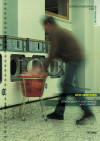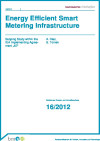Suchergebnisse für "Factsheet: Energietechnologien gestalten, die für alle sinnvoll und nutzbar sind"
DIM4Energy - Digital Information Models for the Planning and Optimization of Buildings and Urban Energy Infrastructure
Digital information models (DIM) are playing an increasingly important role in urban planning and decision-making processes, from individual buildings (BIM) to urban information models (UIM). For the planning and optimal operation of plus-energy neighborhoods, valuable information could be obtained from these existing models, provided the appropriate data sources and associated software tools are properly linked.
fit4power2heat
The integration of heat pumps can increase the cost effectiveness of existing heating networks and counter the high costs for the expansion of power grids at the same time. Aim of the project is to develop innovative business models for small and medium municipal heating networks with focus on synergies between heat and power market. Main focus is a heat pump pooling for several heat grids.
ThermoCluster - Heat generation from infrastructure projects and integration into decentralised low-temperature heating and cooling networks for plus-energy districts
Integrative assessment of the geothermal potential of the Brenner base tunnel and the northern portal area, and the subsequent distribution of the heat generated from these sources to the end-consumer in potential plus-energy districts of the city of Innsbruck.
Technological as well as economical optimized Biomass CHP systems with regard to state-of-the-art technologies.
Analysis and presentation of representative biomass CHP systems with an electric power output of less than 2 MW. Variation of parameters and identification of potential optimized interactions between specific units. Identification of the economically and thermodynamically most optimized interconnection based on state-of-the-art technologies.
Valuation models for future energy clusters considering market, technology and policy uncertainty - Case Study Biomass
Market liberalization, technological change and increasing complexity of international policy processes (e .g. climate negotiations) necessitate new approaches to evaluating investments in an uncertainty and risk-augmented framework. This project developed valuation methods from financial theory - such as real options valuation and portfolio optimization - to quantify the relative competitiveness of bioenergy chains and total energy systems.
Housing 4.0 - digital platform for affordable living
The main aim of this project is the development of an integrated framework for the digital platform "Housing 4.0"; thus supporting integrated planning and project delivery through coupling various digital tools and databases. Thereby, the potentials of BIM for modular, off-site housing assembly in order to improve planning and construction processes, reduce cost and construction time and allow for mass customization will be explored. The novel approach in this project is user-involvement; which has been neglected in recent national and international projects on off-site, modular construction, supported by digital technologies.
IEA ECBCS Annex 49 Midterm Report (2010)

Low Exergy Systems for High-Performance Buildings and Communities
Englisch
Timber Passive House at Mühlweg, 1210 Vienna
Low-rise housing with 70 units (200 residents) in solid wood plate construction designed to meet European passive building standards. Strategies for highly ecological and sustainable building within the economic constraints of social housing, Mühlweg, 1210 Vienna. Industrial pre-fabrication, ...
INNERGY - Real laboratory in the central Inn-valley for climate-neutral semi-urban areas
Sustainable energy supply solutions for existing quarters and industry had been surveyed holistically and cross-sectorally in a small-structured area, consequently pilot projects had been elaborated with the aim to build up a climate-neutral region.
CityStore - Sondierung des wesentlichen F&E-Bedarfs zur Optimierung von städtischen Energiespeichern in integrierten Energiesystemen
CityStore pursues a first-of-its-kind, innovative approach on spatial location of storage needs and potentials. This includes the evaluation of concrete challenges and prerequisites as well as the identification of useful storage technologies and capacities. Model calculations for the model cities Graz and Weiz will be carried out. If, and to which extent, the results can be generalized will be investigated in the Follower Region South Burgenland. The results should enable optimized planning and realization of urban energy storage facilities – thereby enabling targeted investments in energy infrastructure to achieve (local) climate and energy targets.
Refurbishment of an existing villa of the "Gründerzeit" to passive house standard with passive and active solar use
The project shows in an exemplary way how buildings of the time of "Gründerzeit" could be maintained and could offer a better environmental balance including the view of the village and the traffic than a new building. As an example a villa has been converted into a multi-family house within a larger housing project.
IEA Experts Group "R&D Priority Setting and Evaluation" (EGRD). Working period 2024 - 2026
The IEA Experts Group (EGRD) was established by the Committee on Energy Research and Technology (CERT). It examines analytical approaches to energy technologies, policies, and research and development and evaluates the benefits of RTI policies. Its results and recommendations feed into IEA analysis, and enable a broad perspective of energy technology issues.
BIGMODERN - Subproject 2: Demonstration project of an official building in Bruck
In the frame of this subproject being part of the flagship project BIGMODERN, a decision matrix as well as a handbook for planning, including feasibility analysis and a collection of information, serving as decision guidance for planning and implementation of sustainable building refurbishment, is being developed. In this way, the risk for planners and builders of the usage of new sustainable technologies shall be minimised.
SMARTIES - SMART Innovative Energy Services - Analysis of requirements of smart energy-services
The emerging development of smart grids provides market opportunities for new ICT-based services ("smart value-added services"). Economic and organizational barriers are foreseeable that could affect the establishment of business models and service providers (data formats, connectivity, controllability, etc.). In order to improve the chances especially for new and local actors, SMARTIES proactively tries to eliminate hindrances of innovation.
Schiestlhaus, Hochschwab

An integrated (overall) concept for an ecological alpine refuge hut based on solar energy
solar4.alpine
solar4.alpine - an integrated concept for an ecological alpine refuge hut based on solar energy
Webinar: PVT Certification - lessons learnt when certifying PVT products
9. April 2019
online
The webinar gives an overview of the Photovoltaic/thermal Systems (PVT) certification.
Eco-Services

Strategies for sustainable development
Forschungsforum
4/1999
Herausgeber: BMVIT
Englisch, 6 Seiten
Downloads zur Publikation
Building With Renewable Raw Materials

Indigenous Renewable Raw Materials for the "Building of Tomorrow"
Forschungsforum
4/2002
Herausgeber: BMVIT
Englisch, 6 Seiten
Downloads zur Publikation
Energy Efficient Smart Metering Infrastructure

Scoping Study within the IEA Implementing Agreement "4E"
Schriftenreihe
16/2012
A. Diaz, S. Tomek
Herausgeber: BMVIT
Englisch, 87 Seiten
